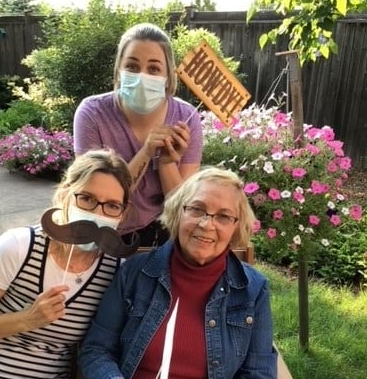
Hearing Loss and Effective Communication

Hearing loss is the third most prevalent chronic condition in older adults. Aging is the number- one cause of hearing loss, affecting nearly 46% of people between the ages of 45 and 87. Left unmanaged, older adults may become withdrawn and socially isolated and face an increased risk of cognitive decline. However, there is encouraging evidence that hearing assistance, such as a hearing aid, can improve the lives of even those with more advanced dementia.
People with hearing loss have to work extra hard to successfully communicate in their day-to-day lives. Even when hearing aids are used, communication breakdowns often occur. One of the most common reasons for a communication breakdown is the poor speaking etiquette of the individuals involved. Some examples include mumbled speech, obstructing visual cues or talking from another room.
Here are some strategies that you can use when communicating with a person who has hearing loss:
- Speak Clearly – Speak in a style that focuses on clear pronunciation of sounds and at a normal rate (not too fast or too slow). Pause to allow the listener time to process what is being said.
- Use Visual Cues – Make sure the individual is close (within five feet) and directly facing you. Ensure lighting is good and keep hands or other barriers away from your face so they can see your lips and facial expressions.
- Get their Attention – Before you start to talk, begin by waving, tapping them on the shoulder, making eye contact and/or saying their name. These cues give them the opportunity to shift their attention and catch the beginning (not just the end) of what is being said.
- Consider the Listening Environment – Keep in mind that it’s easier for hearing aid users to communicate in quiet rather than noisy situations. Reduced tolerance for loud sounds in people with hearing loss is not uncommon. Often having the person in a smaller room with less noise is more favourable for effective communication. It is also important to try and keep background noise to a minimum (e.g., television, dishwashers).
- Be Patient – It is important to remember that although hearing aids provide access to everyday sounds, they do NOT return the user’s hearing back to normal. The person may hear your voice, but may still have difficulty understanding some words. There may be times you need to repeat, rephrase, simplify or write down what you are trying to say.
At the McCormick Day Program we are always looking for ways to more effectively communicate, and we strive to ensure the inclusion of all of our clients in a barrier-free environment. Try using these tips we’ve provided to help you communicate more effectively with someone you know who may be challenged by hearing loss.
Submitted by Recreation Staff at McCormick Dementia Services.